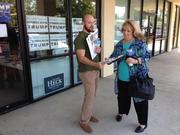
RENO, Nevada (AP) --
It was more than a routine get-out-the-vote knock on the door when Iraq War veteran and Nevada Republican Party staffer Jon Staab asked Kenneth Olofson, a Vietnam veteran, if he'll be voting for Donald Trump. An instant bond was formed as the two swapped stories of service and those of relatives who fought in World War II.
"I don't miss an election," Olofson, 74 and a lifelong Republican, said. "Whenever I vote, I think of Normandy."
A few blocks away, Daniel Mendoza, also an Iraq war veteran canvassing for the GOP, was promptly kicked off another elderly veteran's property at the mere mention of Trump's name.
Two years ago, the Republican National Committee hatched a plan to bolster turnout for veterans, who traditionally lean Republican. The party calculated that 6.5 million veterans either didn't register to vote or didn't cast a ballot in the 2012 presidential election. In the shadow of the Obama administration's controversial management of the Veteran's Administration, the RNC compiled lists of veteran voters and hired veterans for an unprecedented get-out-the-vote effort.
Then Trump won the party's presidential nomination, and his controversial rhetoric has rubbed some veterans the wrong way. The billionaire businessman has mocked Sen. John McCain for being captured during the Vietnam War, threatened to withdraw from NATO and feuded with a slain soldier's family that criticized him during the Democratic National Convention.
On Tuesday Trump released a list of former military leaders who support him. Clinton countered with a television ad featuring veterans silently watching some of Trump's more controversial statements. "Our veterans deserve better," the ad states.
There's limited polling on where veterans stand in the current presidential election. They supported Mitt Romney by 20 points in 2012 and John McCain by 10 points in 2008. But Trump has had trouble winning the support of some of his party's base, and veterans are no exception.
"The nail in the coffin for him was his NATO stuff," said Colton Jordan, a 28-year-old former Navy SEAL and lifelong Republican, as he waited in a Las Vegas nightclub for a rally with his preferred candidate, Libertarian party nominee Gary Johnson.
Still, Republican operatives are confident that if they turn out veterans, they'll turn out more votes for Trump.
"Being a veteran, your skin's a lot thicker," said Mendoza, 24, who noted that he's both Hispanic and a veteran - two groups Trump has disparaged - but he still supports Republican nominee. "It conditions you to seeing that bigger world and seeing past what someone says off the cuff."
The instant bond that veterans form with each other often defuses tension inherent in political canvassing and opens doors that would otherwise be closed, said Bob Carey, a former Navy captain and the RNC's veterans outreach director. But their political utility goes beyond that. "Veterans have a disproportionate ability to gain the trust of any voter," Carey said. "The military is the last institution that has the trust and respect of the general public."
Veterans vote at a higher rate than civilians, but younger veterans are less likely to vote than their peers. That's no surprise to Staab. He was deployed to southern Iraq in 2008 where his unit received mail once a month and had to create a base virtually from scratch at an abandoned air field. He didn't even remember to vote in the presidential election back home.
Many veterans feel out of place after returning from war, and Staab and Mendoza, who returned from Iraq more recently are no exception. Mendoza is still dizzied by the carefree way some of his fellow students act. "People take being a citizen for granted," he said.
Staab now runs the GOP's Reno office and has recruited Mendoza and a cadre of veteran volunteers to call other veterans and knock on their doors. In Nevada, the veterans outreach has a dual purpose - helping Trump and also the GOP's senate candidate, Rep. Joe Heck, a brigadier general in the army reserves.
Vicky Maltman, an veterans' activist whose husband received a Purple Heart in Vietnam, at first refused to help Staab because she didn't want to be associated with partisan politics. Now she happily volunteers because she believes the program is trying to mobilize a group she fears is growing politically alienated. "A lot of our veterans feel like they're forgotten about," she said.
On a recent afternoon, Staab knocked on doors of veterans in a comfortable subdivision dotted with signs warning of wild horses that roam through the streets. Staab routinely introduced himself as a veteran and touted Trump's 10-point plan for improving veterans' issues, highlighting item six, a promise to create a special White House phone line for veterans having problems getting medical care. He also noted that Heck ran a hospital in Baghdad during the surge - and Staab added that he himself served during that operation.
Even those who turned Staab away received a quick "thank you for your service" before the door clicked closed. "Part of the outreach is just thanking them for their service on behalf of the Republican party," Staab said.



